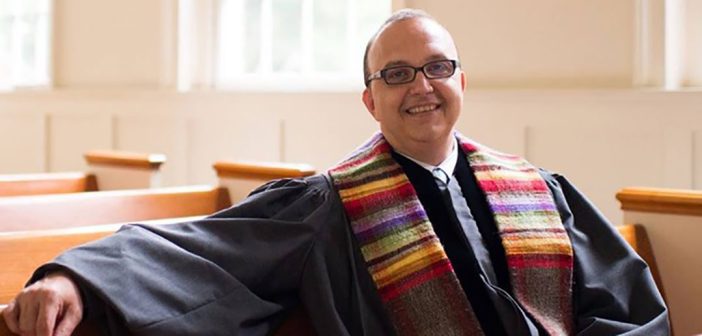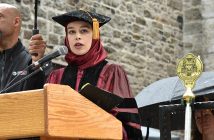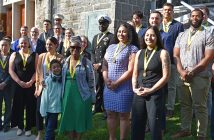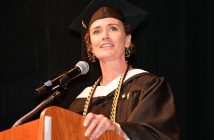“I was looking for a degree in Christian spirituality. I started with the certificate program in spiritual direction, and then I ran out of classes and I was still interested,” he said with a smile.
He pursued a master’s degree at GRE, still not planning on going for a doctorate. But the opportunity to dive deeper into areas such as practical theology and spiritual direction was appealing to him.
“I was able to explore interests I had without feeling too constrained,” he said. “The great surprise for me was all the work we did around the field of practical theology.”
A ‘Transformative’ Practical Theology Class
Suriano said that the practical theology class he took, taught by religion professor Thomas Beaudoin, Ph.D., was transformational.
“He, in his own gentle and persistent way, got all of us to think differently about our ministry,” he said. “I can’t really say enough about how that semester changed my ministry here at the church and my ideas around it.”
Beaudoin said he teaches students to use practical theology to examine and understand their own lives and spiritualities.
“The ultimate curriculum is the student’s life, and so theology matters in part because we need to learn how to reckon with our lives—our lives individually and our lives together,” he said.
Beaudoin said that as a part of the program, Suriano was able to reckon with his unique spiritual background. He came to Fordham after decades in church ministry, which started when he was ordained a Catholic priest before he joined the United Church of Christ in 1993.
“He was interested from the beginning in using the language of Christian spirituality, to hold together his Protestant and his Catholic heritage and commitments,” Beaudoin said.
A Queer Vocation
Beaudoin said that one way Suriano did this was through his study of queer theology and his eventual thesis, “A Queer Vocation: Growing into Power.”
Suriano said that studying queer theology helped him develop a sense of “how I as a queer person have a voice in the church, that I may speak to the church in a way that is powerful and meaningful,” he said.
He called his thesis a “great intersection between some personal work and also some work about the church itself, including the congregation I serve.”
“I began to explore, just briefly, in my thesis about how for queer people in the church there is this connection with Christian spirituality and how to find our place in the church that isn’t centered around the debate over whether or if we should be there,” he said, but instead centered around some of the unique gifts that queer people can bring.
Past, Present, and Future
Beaudoin said when Suriano was able to “engage wholeheartedly in queer theories and queer spirituality,” it “really opened him up to a new horizon.”
“There was something noble and challenging and nourishing about this idea of queer vocation, and he really claimed that in three ways: as a way to make sense of his heritage; and then queer vocation as a way to understand what he’s about intellectually and spiritually now; but then also as a hopeful path to and through retirement in ministry.”
Beaudoin said that it was rewarding to see Suriano, who had already accomplished so much before coming to the program, “say an even deeper yes” to his life, vocation, and intellectual project.
“He’s so thoughtful, and he’s so reflective,” he said. “Also it’s humbling—it puts me in the role of perpetual student to be in the presence of students like that. I get to learn from his example as he goes deeper.”



